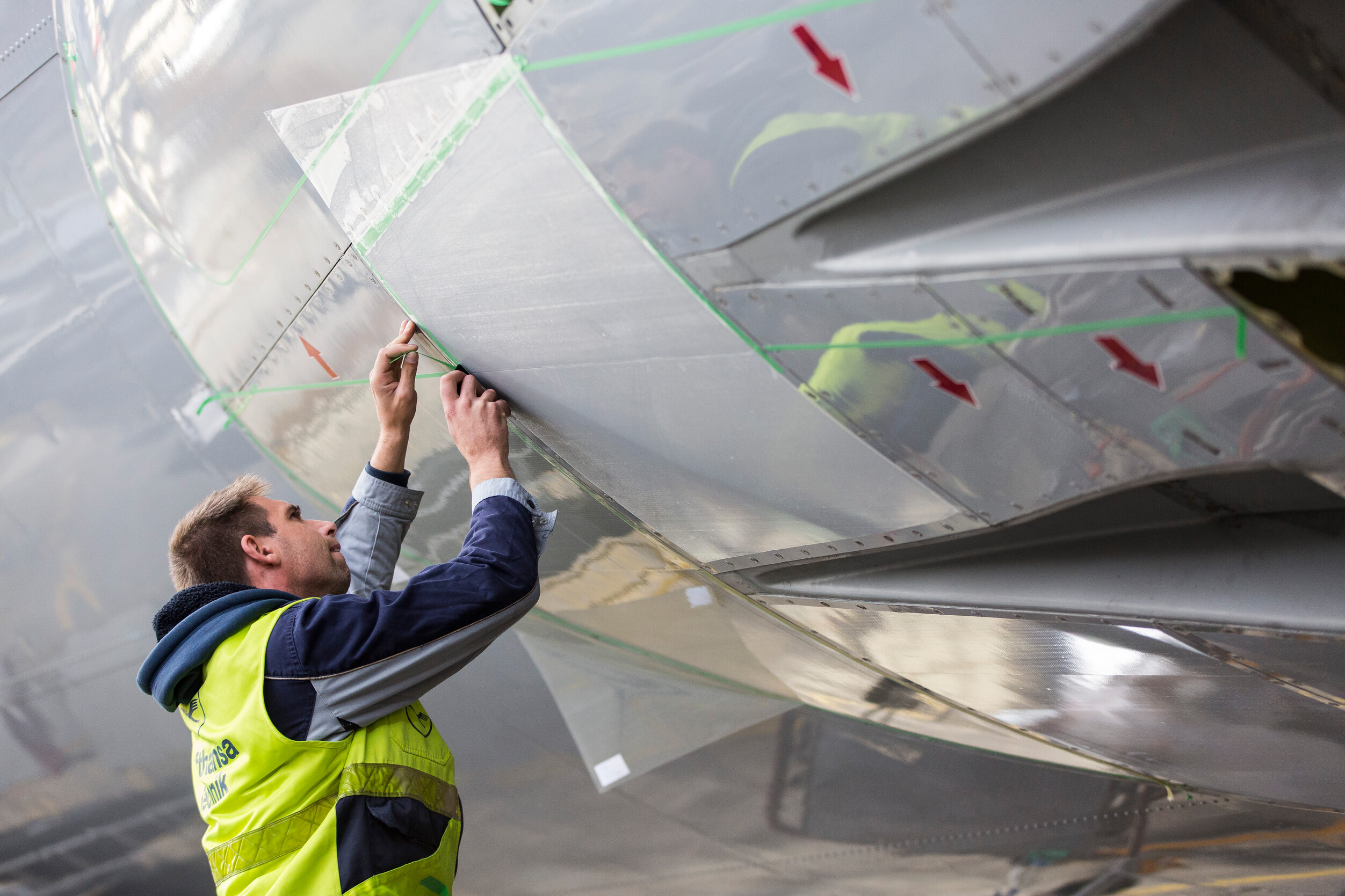From 2022, Lufthansa Cargo will equip all Boeing 777 freighters with AeroSHARK – an innovative surface technology from Lufthansa Technik and BASF that improves fuel efficiency and helps airlines to reach sustainability targets.
The lower the frictional resistance of an aircraft in the air, the lower the fuel consumption. Using nature as a role model, the aviation industry has been intensively researching ways to reduce aerodynamic drag for many years. Now Lufthansa Technik and BASF have succeeded in making the breakthrough as part of a joint project.
AeroSHARK, a surface film that mimics the fine structure of a shark's skin, is to be rolled out on Lufthansa Cargo's entire freighter fleet from the beginning of 2022, making the aircraft more economical and reducing emissions.
The surface structure consisting of riblets measuring around 50 micrometers imitates the properties of sharkskin and therefore optimizes the aerodynamics on flow-related parts of the aircraft. This means that less fuel is needed overall. For Lufthansa Cargo's Boeing 777F freighters, Lufthansa Technik estimates a drag reduction of more than one percent. For the entire fleet of ten aircraft, this translates to annual savings of around 3,700 tons of kerosene and just under 11,700 tons of CO2 emissions, which is the equivalent of 48 individual freight flights from Frankfurt to Shanghai.
"Responsibility for the environment and society is a key strategic topic for us," says Christina Foerster, Member of the Executive Board of Deutsche Lufthansa with responsibility for sustainability. "We have always played a leading role in introducing environmentally friendly technologies. The new sharkskin technology for aircraft shows what strong and highly innovative partners can achieve collectively for the environment. This will help us to achieve our goal of climate neutrality by 2050."
"The aviation industry is facing similar challenges to the chemical industry: ongoing progress must be made with climate protection despite high energy requirements. By collaborating closely and successfully combining our know-how in surface design and aerodynamics, we have now succeeded in taking a major step forward. This is an excellent example of sustainability in practice, achieved through partnership-based collaboration and innovative technologies," says Dr. Markus Kamieth, Member of the Board of Executive Directors of BASF.
"We are proud that we will now be able to operate our entire freighter fleet even more efficiently in the future thanks to sharkskin technology and reduce the carbon footprint of our modern fleet further. The investments we have made in rolling out AeroSHARK at Lufthansa Cargo consciously reaffirm our commitment to the United Nation's sustainable development goal on climate action," explains Dorothea von Boxberg, Chief Executive Officer of Lufthansa Cargo.
In its cooperation with BASF, Lufthansa Technik is responsible for the material specification, approval by the aviation authorities and performance of aircraft modifications carried out as part of regular maintenance layovers. Backed by decades of experience as an approved aviation design organization, the company will obtain a Supplemental Type Certificate (STC) for the 777F from the European Union Aviation Safety Agency (EASA), which is required for operation.
"We have always used our wealth of expertise as a global market leader in technical aircraft services to also contribute to reducing the ecological footprint of our industry. In doing so, we can leverage significant savings potential from all aircraft generations," explains Dr. Johannes Bussmann, Chief Executive Officer of Lufthansa Technik. "I am therefore very proud that we will soon be able to transfer the positive findings of the validation phase into the series application with Lufthansa Cargo. The extremely constructive collaboration with BASF is also the best example of cross-sector cooperation in the interest of the sustainability of the aviation industry."
The aviation industry has been researching the use of sharkskin for aircraft for many years, albeit often just on a small scale. For the first time at the end of 2019, Lufthansa Technik and BASF fitted almost the entire lower half of a Lufthansa Boeing 747-400's fuselage with 500 square meters of such a jointly developed sharkskin surface and had this modification certified by EASA. This aircraft (registration D-ABTK) subsequently validated the savings potential of the technology on scheduled long-haul services during more than 1,500 flight hours. This provided unequivocal proof that emissions were reduced by around 0.8% thanks to the sharkskin modification. The savings for the Boeing 777F are estimated to be even higher, because the application areas are even larger in this case due to the absence of window rows on a freighter, among other reasons. The savings are validated using a software for fuel consumption analyses developed by Lufthansa Technik, which allows the effectiveness of a wide variety of different aircraft modifications to be demonstrated reliably based on comprehensive data.
Lufthansa Technik and BASF intend to continue developing the new technology consistently to include additional aircraft types and even larger surfaces so that they can support airlines around the globe even more comprehensively in the future in reaching their sustainability goals. Initial model calculations show that use of sharkskin technology at its highest expansion level could reduce CO2 emissions by as much as three percent.

